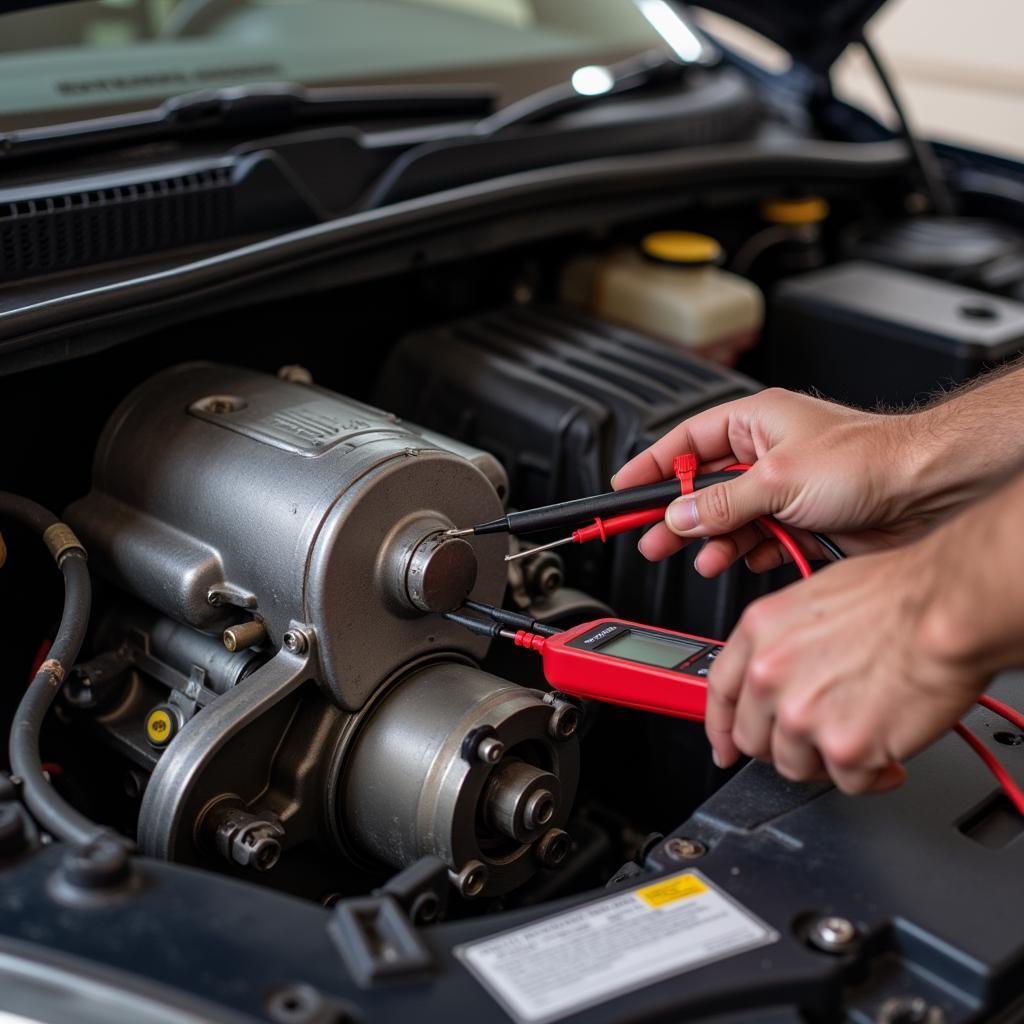My car won’t start, but the battery isn’t dead! This frustrating scenario is more common than you think. While a dead battery is often the culprit, there are several other reasons why your car might refuse to start, even with a fully charged battery. This article will explore the most common causes and guide you through diagnosing and potentially fixing the problem yourself. If you’re stuck on the side of the road with a car that won’t start, this information could be invaluable.
Common Reasons Why Your Car Won’t Start (Even With a Good Battery)
There are numerous reasons your car might refuse to cooperate, from simple fixes to more complex issues. Let’s break down some of the most common culprits when your car won’t start but the battery is not dead.
-
Starter Motor Issues: The starter motor is responsible for cranking the engine. A failing starter motor might click repeatedly, whine, or do nothing at all.
-
Faulty Alternator: While a good battery gets you started, the alternator keeps it charged while the engine runs. A faulty alternator can drain your battery even while driving, leading to a no-start situation later.
-
Fuel System Problems: A lack of fuel, a clogged fuel filter, or a malfunctioning fuel pump can prevent your engine from starting.
-
Ignition System Malfunctions: This includes issues with the ignition switch, ignition coil, spark plugs, or wiring. Without a proper spark, the fuel won’t ignite.
-
Key Fob or Immobilizer Problems: Modern cars have sophisticated anti-theft systems. A dead battery for key fob or a malfunctioning immobilizer can prevent the car from starting.
Diagnosing the Problem: What to Check When Your Car Won’t Start
If your car won’t start but the battery is not dead, follow these steps to help pinpoint the issue:
-
Listen Carefully: When you turn the key, what do you hear? Clicking sounds often indicate a starter problem. A whining sound might point to the starter or alternator. No sound at all could mean several things, including a faulty ignition switch.
-
Check the Fuel Gauge: Is it possible you simply ran out of gas? While this might seem obvious, it’s easily overlooked.
-
Inspect the Key Fob: If you have a key fob, try replacing the battery. You might be surprised how often a dead key fob battery is the culprit, especially with challenger key fob battery issues.
How Can I Test My Starter Motor at Home?
There are a few ways to test your starter motor. One is to have a helper turn the key while you tap the starter motor with a hammer (be careful!). If the engine starts, the starter is likely the problem. You can also check the voltage at the starter with a multimeter when someone tries to start the car. Low or no voltage indicates a wiring or solenoid issue.
 Testing a car's starter motor
Testing a car's starter motor
Could it be my Alternator?
A failing alternator can cause your car not to start because it isn’t charging the battery properly. A simple test is to jump-start your car. If the car starts but dies shortly after, the alternator is likely failing.
“A common misconception is that a good battery guarantees a start. A faulty alternator can drain your battery, even on short trips, leading to a ‘my car won’t start but the battery is not dead’ situation,” says John Smith, Senior Automotive Technician at ABC Auto Repair.
Remote Diagnostics and Programming: The Future of Car Repair
Modern vehicles are increasingly reliant on software. Remote diagnostics and programming can identify and sometimes even fix certain problems without a trip to the mechanic. These services offer convenience and can save time and money. This might be particularly helpful if you’re experiencing issues with your dodge ram key fob not working or need dodge key fob programming.
Conclusion: Getting Your Car Back on the Road
When your car won’t start but the battery is not dead, it can be a perplexing problem. By understanding the potential causes and following the diagnostic steps outlined above, you can often identify the issue. While some fixes are simple DIY tasks, others require professional help. Remember, remote diagnostics and programming are increasingly valuable resources in modern car repair, offering efficient solutions for certain issues. So, don’t panic the next time your car refuses to start – with a little knowledge and troubleshooting, you can get back on the road quickly and safely.
FAQ
-
What are the most common causes of a car not starting with a good battery? Starter motor problems, faulty alternators, fuel system issues, and ignition system malfunctions are common culprits.
-
How can I tell if my starter motor is bad? Clicking sounds when turning the key, a whining noise, or no sound at all could indicate a starter issue.
-
Can a bad alternator prevent my car from starting? Yes, a failing alternator won’t charge the battery, leading to a no-start situation.
-
What should I do if I suspect a fuel system problem? Check the fuel gauge and if necessary, have your fuel pump and filter checked by a mechanic.
-
How can remote diagnostics help with car starting problems? Remote diagnostics can identify software-related issues and sometimes even fix them remotely.
-
What should I do if I’ve tried everything and my car still won’t start? It’s time to call a qualified mechanic for professional diagnosis and repair.
-
Is it dangerous to try and diagnose car starting problems myself? Some diagnostic steps are safe, but others require specialized knowledge and tools. If you’re unsure, consult a professional.

